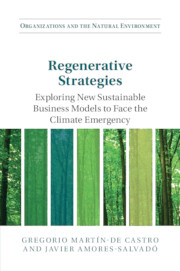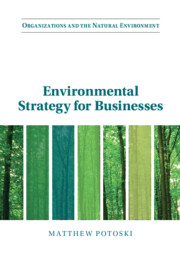Regenerative Strategies
In the current climate emergency, it is no longer enough for businesses to simply employ environmental strategy typologies focused on 'greening the business' and maintaining the 'business-as-usual' logic. Gregorio Martín-de Castro and Javier Amores-Salvadó argue that disruptive business models and solutions are now required, and they propose a new regenerative strategy linking climate science to management studies. The main features of this strategy are:cutting-edge climate science solutions (capturing and utilizing atmospheric carbon dioxide to produce net-zero or net-negative emissions and positive environmental externalities) and a redefined firm purpose under an ecological, ethical and moral paradigm (integrating ecoemotional wealth, environmental performance, systemic socioecological resilience, wider stakeholder management and a very long-term perspective). They demonstrate that, by applying this strategy, companies can not only reduce their negative environmental externalities and create positive environmental externalities, but also reverse current environmental degradation through a new sustainable capitalism.
- Presents extensive scientific evidence on the current state of the climate and argues that natural science and management studies must work together to look for solutions to our planet.
- Critically reviews existing environmental strategies and designs a new disruptive business model and solutions to fight the current climate emergency.
- Uses the real business case of Canadian company, Carbon Engineering, and its two main technologies: Direct Air Capture and Air to Fuels to illustrate regenerative strategy and its main features and put it into action.
Reviews & endorsements
'The climate emergency demands that we radically reinvent both the institutions of capitalism and the raison d'etre of business. Regenerative Strategies provides business and government leaders the requisite roadmap to achieve a truly sustainable form of commerce.' Stuart L. Hart, Co-Founder, University of Vermont's Sustainable Innovation MBA Program and author of 'Beyond Shareholder Primacy'
'Regenerative Strategies is a useful addition to recent discussions about the urgency of net positive carbon emission strategies versus reduction or mitigation carbon strategies. Without net positive or regenerative carbon strategies, the world does not currently have a pathway to ensure that average temperature increases are maintained below 2 percent in the 21st Century. The book adds a review of the extant academic literature on the topic and provides examples that will be useful for firms looking for ideas to generate net positive emissions.' Sanjay Sharma, Dean and Professor of Management. Grossman School of Business, University of Vermont
'Recommended.' J. Tuwun, Choice
Product details
April 2024Hardback
9781009261937
262 pages
235 × 160 × 20 mm
0.53kg
Available
Table of Contents
- 1. Introduction
- 2. Assessing the response to the climate grand challenge: institutions, governments, business practice and management research
- 3. Business-as-usual: a review of environmental strategies
- 4. Sustainable business models
- 5. Climate emergency in the anthropocene era
- 6. The regenerative strategy
- 7. Regenerative strategy: facing the climate emergency
- 8. Concluding remarks.




